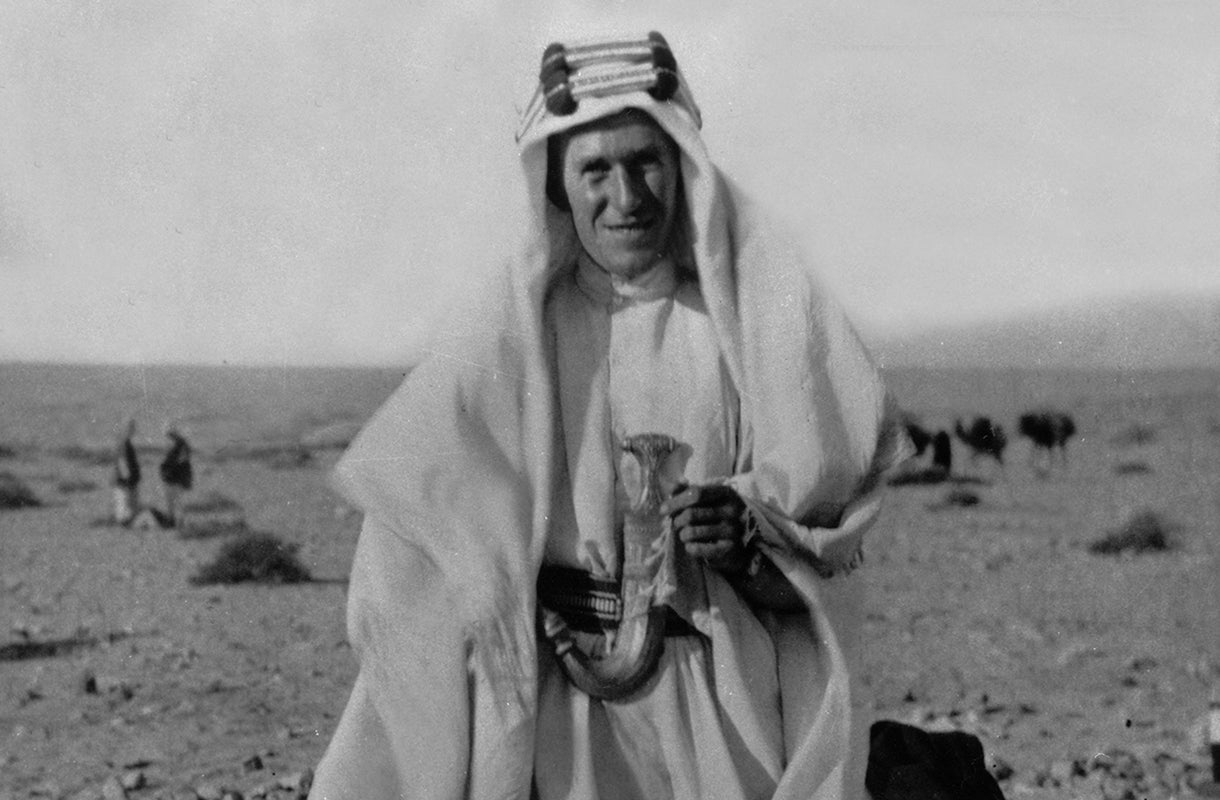Lawrence of Arabia’s robes and dagger set to be saved for the nation - if a British buyer can be found
Exclusive: A temporary export bar has been placed on the historic items after they were bought at auction by a mystery foreign buyer

Your support helps us to tell the story
From reproductive rights to climate change to Big Tech, The Independent is on the ground when the story is developing. Whether it's investigating the financials of Elon Musk's pro-Trump PAC or producing our latest documentary, 'The A Word', which shines a light on the American women fighting for reproductive rights, we know how important it is to parse out the facts from the messaging.
At such a critical moment in US history, we need reporters on the ground. Your donation allows us to keep sending journalists to speak to both sides of the story.
The Independent is trusted by Americans across the entire political spectrum. And unlike many other quality news outlets, we choose not to lock Americans out of our reporting and analysis with paywalls. We believe quality journalism should be available to everyone, paid for by those who can afford it.
Your support makes all the difference.Lawrence of Arabia’s famous white robes and ornate dagger are set to be saved for the nation after lobbying by Foreign Office minister and Lawrence-admirer Tobias Ellwood.
A temporary export bar had been placed on the historic items by the Government earlier this year, after they were bought at auction by a mystery foreign buyer. An alternative buyer would have to now match the considerable asking price of £122,500 for the dagger and £12,500 to save the robes for the nation.
Government sources now say that they are hopeful a successful purchase will take place. The Arts Council, which administers temporary export bans on items of cultural significance, said serious expressions of interest had been received, and have extended the deferral period until 1 July to allow time for funds to be raised.
Middle East minister Mr Ellwood – an ex-army captain and admirer of First World War hero T.E. Lawrence – is understood to have taken a keen personal interest in the items’ fate, and has insisted they should be put on display in the UK to spark interest in Lawrence’s exploits and his role in shaping UK-Arab relations to this day.
Lawrence, whose role in the Arab Revolt of 1916-18 made him globally famous, wore the robes in some of the most famous portraits made of him at the time, crafting a heroic image of himself that was later immortalised in the classic 1962 David Lean film.
The ornate dagger, a steel jambiya with a curved blade, gilded silver hilt and scabbard, was presented to Lawrence after the victory against the Ottoman army by Arab forces at Aqaba, now in present day Jordan, in 1917. It was given by Sherif Nasir, a cousin of Lawrence’s close ally Emir Feisal, who went on to become king of Syria and later Iraq.
Culture minister Ed Vaizey placed the export bar on the items in February, calling Lawrence “one of the most extraordinary figures of the 20th century”. Such temporary pauses in export licencing decisions can be applied to items with special historical and cultural significance to the UK.
The Arts Council could not confirm the identity of the potential buyers, but the Foreign Office said it was not directly purchasing the items.

Lawrence wore the robes and the dagger while sitting for a portrait by sculptress Kathleen Scott – the widow of Antarctic explorer Robert Falcon Scott – in 1921. After sitting, he left both items with her so that she could complete the work, but then never retrieved them. They remained with the family until they were sold at Christie’s auction house in July 2015.
Although he faced accusations of deliberately cultivating a romantic image of himself, Lawrence explained the more practical purpose for wearing Arab robes, originally at Emir Feisal’s suggestion, in his epic memoir Seven Pillars of Wisdom.
“If I wore Meccan clothes,” he wrote, “[the Arabs] would behave to me as though I were really one of the leaders; and I might slip in and out of Feisal’s tent without making a sensation which he had to explain away each time to strangers. I agreed at once, very gladly; for army uniform was abominable when camel-riding or when sitting on the ground; and the Arab things…were cleaner and more decent in the desert.”
Join our commenting forum
Join thought-provoking conversations, follow other Independent readers and see their replies
Comments